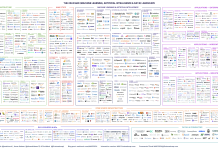Sascha Giese, Head Geek™, SolarWinds, discusses the importance of soft skills for IT professionals, and steps they can take to develop these
As public sector IT environments become more complex and the demands on tech professionals grow, so does the range of skills required to succeed on a technical and career level. Specialised knowledge and skillsets have always helped set IT specialists apart, but what’s increasingly key is developing a holistic set of capabilities, emphasising non-technical, soft skills. While these have always been crucial in public-facing roles, it’s now becoming evident they’re just as important behind the scenes.
Now more than ever, IT pros must work alongside senior leaders to meet organisational goals while investing time and energy into cultivating the necessary skills to drive success. From interpersonal communication and teamwork, to adaptability, creativity, and attitude, soft skills aren’t industry-specific and aren’t always emphasised in professional development as much as technical capabilities. This no longer meets the needs of employers and their technology teams, however, who increasingly recognise that soft skills aren’t optional—they’re essential.
Fostering human, non-cognitive, and interpersonal skills enabling people to communicate with clarity and empathy is key to ensuring mutual respect and understanding. Many IT pros find they’re often involved in projects and initiatives requiring the capability to drive the organisation forward and make a lasting impact. This makes effective communication critical.
What the evidence shows
Data from the recent SolarWinds® IT Trends Report 2020: The Universal Language of IT underlines how the convergence of technologies and responsibilities have changed the roles and skillsets required of many U.K. public sector IT professionals over the past three to five years. Not only do they work against the backdrop of increased working week hours (55% identify this as a change to their role), but many now work also with additional IT staff (37%) and increased on-premises responsibilities (33%). At the same time, having more non-IT responsibilities (i.e., presentation skills, public speaking, business writing/planning, justification of time/budget) has changed the role for 33% of research respondents.
As a result, IT pros point towards key non-technical skills as most critical to successfully managing today’s complex IT environments. These include project management (69%), people management (59%), and interpersonal communication (55%) as the top three. These results are echoed by CIO’s annual State of the CIO Survey, which revealed the top skills needed for digital transformation were strategy building (40%), project management (32%), and business relationship management (25%).
These critical interpersonal skills become more important as IT pros increasingly communicate and collaborate across previously siloed IT functions. And, according to the LinkedIn® 2020 Emerging Jobs Report, the demand for these specific soft skills, alongside other areas such as creativity, will continue to rise across the SaaS industry.
Steps to developing soft skills
IT pros in the public sector looking to develop their soft skills have an array of learning and development options that don’t break the budget, and are geared towards both formal and informal needs. The first step should be to check with their managers to understand whether there are courses or content already available. Beyond this starting point, there are various options, including:
- Find a mentor. Working with someone on the team who can help develop soft skills can prove invaluable. Practicing communication skills and trying other areas such as project management, for example, with a mentor is a great way to learn by doing.
- The Open University offers a range of free online courses covering soft skills, ranging from effective communication and personal branding to working in diverse teams and how to succeed in the workplace. Each course is presented with an estimate of the time required and users can assess options with the help of course reviews.
- YouTube has a wide array of soft skills training videos Choosing the right option can be a challenge, but evaluating the prevailing positivity of comment feedback (or otherwise) can help make the decision easier. Also, checking in with colleagues or asking for suggestions from trusted online communities is another great way to cut through the noise and find useful training content.
- LinkedIn Learning has a specific area geared towards the development of soft skills. The service offers a free demonstration, and there’s an online chat function available, so users can get answers to preliminary questions before going further.
As public sector organisations worldwide face new challenges and uncertainty, senior leaders and IT pros alike must take this reality seriously, focusing on skills development and readiness in key areas. While IT continues to be a main driver for success, people across the tech industry have an opportunity to help reassure their organisations and focus by enhancing their capabilities now and into the future.











